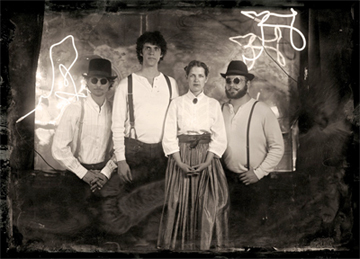Last week, I got the chance to fill in for Liz, our usual speculative theater buff, and go see Futurity, a science fiction musical/song cycle from Brooklyn-based band The Lisps.
In one sense, the show’s only science-fictional supposition is that mathematician Ada Lovelace, played by Sammy Tunis, lived into the years of the American Civil War. They had me at Ada, really; she’s the perfect person to bring into your sci-fi musical to add a touch of realism and a touch of big-R Romance. The time period also means that The Lisps could access the steampunk aesthetic that’s rapidly becoming familiar to the least-nerdy consumers of pop culture; Ada’s fitted vest and voluminous skirt are perfect with her messy, pinned-up hair and bright red lipstick, and I think I spotted a pair of goggles on a chorus member.
The show’s other protagonist is Union soldier Julian Munro (César Alvarez), who is working on a story about an infinitely complex machine that manufactures peace. He writes to Ada for advice, since his machine is based on the analytical engine that was the subject of her famous commentary, and they speak and sing their correspondence and bits of Julian’s story. Meanwhile, Julian’s unit has been assigned to destroy Confederate railroads; the chorus chants “Rail! Tie! Rail! Tie!” and pounds their rifle butts on the ground as Julian is trying to write. The letters, the war, and the Inventor and his fabulous machine overlap and blur together and make it all seem more surreal and science fictional. The show is short and coheres around themes of creativity and death, which is enough for me, even without any real scenes or action.
The music is mostly recitativo-style, with little rhyming and fully-formed sentences expressing complex ideas. Wildly complex for a musical, actually, although I understood better when I saw in the program that much of the text is slightly modified extracts from Ada Lovelace’s actual correspondence. You can listen to the track “Thinking” to get an idea of the sound. I found it charming; if the words are already interesting, the music is gravy. I’ll forgive the few places where emphasis gets forced for lyrics like this:
“Mathematical meaning
May be expressed
By the movement of material things
Just like the fingers on your hand,
The gears of a machine
Count the songs the equation sings.”
Overall, Furturity was a smart little event. If I sound at all “meh” about it, it’s because Joe’s Pub isn’t really my kind of venue, but I am a dirty hippie and I would usually rather sit on the grass than in a bar and I am mildly allergic to minimums ($12 if you reserve a table). The space is already small, so queue up a little early, sit in the front of the non-table seats, enjoy the show, and then wander over to St. Mark’s to eat falafel and browse through jewelry made out of clock pieces.
Futurity has two more shows scheduled, one for this Friday the 22nd at 8:00 and one Sunday the 24th at 7:30, and you can get tickets here.
[Image from the Futurity promotional materials: photo by Kellam Clark, neon and mirror by Gandalf Gavån]











What, no explication of who the real Ada was and just what analytical engine she helped to create (perhaps I am reading too much SciFi Wire)? I wonder how many other people will know these delicious tidbits of literary history! Hats off to both the reviewer and the theatrical company for bringing this to light.
Pity I won’t be able to see it though. The concept itself is worth the $12.
Er… wasn’t she Lord Byron’s daughter? By his sister?
Ada was Lord Byron’s only legitimate daughter. She was his daughter with his wife, the mathematician. (I recall he wrote a pretty negative poem about that wife and her mathematics.) Ada worked on the difference engine with Charles Babbage. (You may remember that as the title object of a novel by William Gibson and Bruce Sterling.) Ada has a software language named after her. She was really quite brilliant and ahead of her time.
I got this information from a book I’ve had for about 10 years and never finished reading. I’ll have to get back to it. It’s called “Ada, the Enchantress of Numbers” by Betty Alexandra Toole.